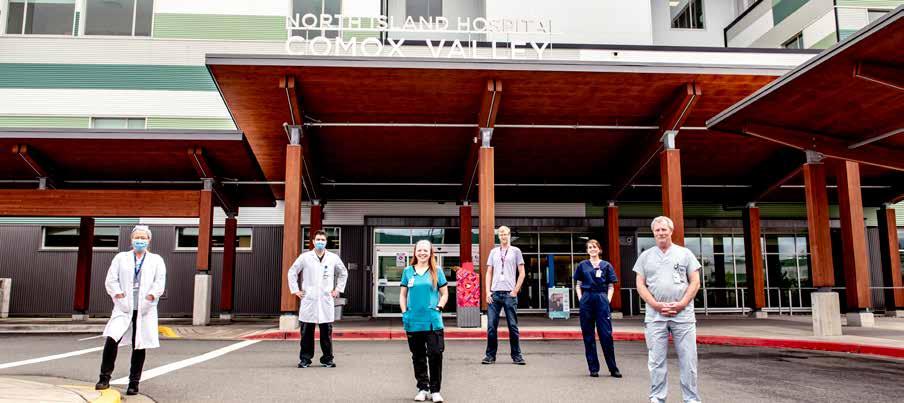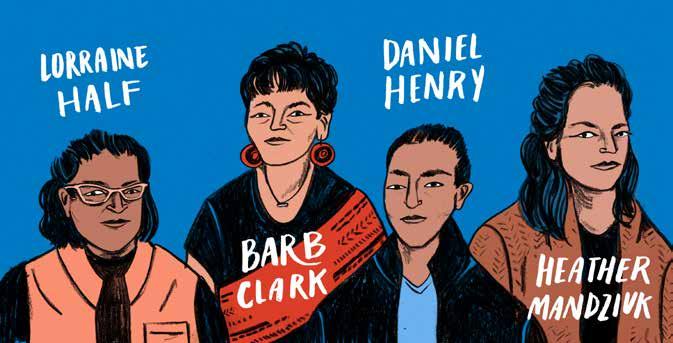
8 minute read
vulnerable in economic crisis
JOB SECURITY Precarious jobs at greatest risk
Industry shutdowns strike vulnerable workers first
WHEN TRAVEL restrictions were imposed during the pandemic, 90 per cent of B.C.’s hotel workers were laid off.
“Tens of thousands of housekeepers, servers, cooks and dishwashers in the hospitality industry immediately found themselves without livelihood, with no guarantees of being able to return to work,” says Michelle Travis of UNITE HERE Local 40, a union that represents hospitality workers.
Government support programs, like the Canada Emergency Response Benefit (CERB), provided workers with some temporary relief. But the pandemic quickly exposed how vulnerable those in low-wage, precarious jobs are in this country.
Both public and private sector unions have long sounded the
Half of those who work in the lowest-paid jobs lost work or hours during the pandemic.
alarm about the steady decline of wages and working conditions that have accompanied the rise of more low-wage, part-time, and “gig” jobs. “We’ve known for years that work is being transformed in Canada,” says Jim Stanford, director of the Centre for Future Work. “We’re moving from more standard, stable jobs towards a model of precarious, ‘just-in-time’ staffing, where workers are treated as disposable.”
The large-scale shutdown of parts of our economy were important public health measures. But the negative impacts were not equally shared.
The Canadian Centre for Policy Alternatives (CCPA) found that half of those who work in the lowest-paid jobs ($14 an hour or less) lost work or hours during the pandemic. Among those who earn $48 an hour or more, only one per cent lost work or hours.
According to Iglika Ivanova, senior economist at CCPA, 75 per cent of those who lost their jobs in B.C. between February and May worked in one of five industries: accommodation and food services; retail; construction; information, culture and recreation; and “other services” (which include personal services, repairs and maintenance, domestic workers, most charities and non-profits).
“Young workers, women, immigrants and racialized workers make up the majority of workers in the lowest-paying and most precarious jobs in our economy,” says Ivanova, “And they have borne the brunt of the economic fallout from the pandemic so far.”
Workers in precarious jobs can also face greater health risks, with inadequate sick leave provisions, high exposure to the public, and
PHOTO Michelle Travis
PROTECT OUR JOBS | Hotel workers from UNITE HERE Local 40 demonstrated at the B.C. Legislature in Victoria July 7, asking government to guarantee that laid-off hotel workers will have the legal right to return to work.
the need to work multiple jobs to make ends meet.
A recent Centre for Future Work report outlined an economic rebuilding plan that recommends better standards and protections for precarious workers.
As for the UNITE HERE Local 40 hotel workers, they fear their employers may not rehire those who were laid off during the pandemic, choosing instead to replace them with new employees who may cost companies less in wages, IN JUNE, British Columbians heard about a deeply disturbing racist game allegedly being played in one or more B.C. hospital emergency rooms.
This prompted an independent investigation into Indigenous-specific discrimination in our health care system.
It should come as no surprise that the health care sector is not immune to the racism and discrimination, and specifically as directed against Indigenous people, that exist in society.
So, when my team set out to conduct an investigation, it was not to determine whether or not racism exists in the health care system, but rather the scope and extent of it.
The health care sector has a unique role to play in helping people when they most need it. But when that system discriminates against any group of peobenefits and seniority.
“Laid-off workers need a legal right to return to their jobs as the industry recovers,” said Travis. “Employers should not be using the pandemic as an excuse to replace them.”
UNITE HERE Local 40 is calling for provincial legislation that will require B.C. employers to rehire those laid-off workers, as well as federal programs to better protect workers.
VOICES
Addressing Racism Investigation Survey
THI VU
ple, then trust and confidence the public has in that system is shattered.
This investigation does not set out to blame and shame. But rather, it provides the health care sector with an opportunity to learn and do better.
We recently launched a survey asking for the experiences of a wide range of health care workers. Our survey asks health care workers the impact of discriminatory behaviours or actions on patients and their family members. But it also asks in what ways health care workers are affected personally in the workplace by racism and discrimination.
This is an opportunity for all of us to find ways of better delivering health care in our province. Mary Ellen Turpel-Lafond is leading the Addressing Racism investigation. Find out more at https://engage. gov.bc.ca/addressingracism/
MENTAL HEALTH Pandemic pressures take toll
Health care workers encouraged to explore mental health resources
THE PANDEMIC has put many pressures on the mental health of frontline workers -- from fears of contracting COVID- 19 at work and infecting loved ones at home, to workplace changes and anxiety about safety.
This is particularly true for workers at long-term care sites, which have undeniably been hit the hardest during this pandemic.
“Workers in long-term care are under pressure at the best of times, and more so during this pandemic,” says Jennifer Whiteside, HEU secretary-business manager.
“Providing good care to residents in this high-stress environment that is full of risk can take its toll on the mental health of frontline workers.”
Not only do long-term care workers experience the same kinds of anxiety and fear about contracting COVID-19, they may also witness the people they care for fall ill, and sometimes die.
And many are distressed that distancing restrictions prevent them from providing residents with the social interaction and level of care so necessary to quality of life.
HEU members are encouraged to access the many mental health supports that are available.
SOME MENTAL HEALTH RESOURCES FOR HEALTH CARE WORKERS

Care to Speak
This is an online peer support and referral service provided by the Canadian Mental Health Association and SafeCare BC for continuing care and community health care workers. The service provides online or telephone access to peer supporters, who have worked on the front line in health care, long-term care and home care. www.careforcaregivers.ca/caretospeak. 1-866-802-7337 (PEER).
Employee Assistance Program
Your employer may provide access to an Employee Assistance Program (EAP). EAPs generally offer confidential counselling and online wellness services to you at no cost. Check with your employer to see whether you have access to an EAP.
BCPA COVID-19 Psychological Support Service
The Psychological Support Service offers psychological first aid telephone calls, free of charge, to any health care or other essential worker (19+) affected by the COVID-19 pandemic. To access this service, visit the website and enter your information: <www.psychologists.bc.ca/covid-19-resources>.
Sick days key issue for public health
HEU MEMBER Consuelo Almadin works at Inglewood Care Centre in West Vancouver. Long-term care has been devastated by COVID-19. And yet independently owned facilities, like Inglewood, provide some of the lowest wages and benefits in B.C.’s health care system.
Almadin is only entitled to five paid sick days a year. This means when she and her co-workers are sick, “we are pretty much forced to go back to work without enough recovery,” she says.
In the wake of the pandemic, improving sick pay provisions has become an important public health issue, as well as a key right for workers.
Several COVID-19 outbreaks at meat processing plants in B.C. and Alberta were the result of employees going to work sick, unable to afford the loss of pay.
In late May, Prime Minister Justin Trudeau announced he was seeking to develop a national program to provide a minimum of 10 days of paid sick leave for all Canadian workers.
“Sick day” provisions are currently regulated by each province, under their employment standards.
The B.C. Federation of Labour has developed a proposal and campaign to mobilize support around paid sick leave. Find out more at <WorkingSickIsntWorking.ca>. ANN JOHANSSON
NEWSBITES
Opioid deaths continue to rise
While British Columbians cope with the COVID-19 pandemic and adjust to the “new normal”, the opioid epidemic continues to claim hundreds of lives in the province.
The B.C. Coroners Service reported 175 deaths related to illicit drug use in June. This is the highest monthly rate since the opioid crisis was declared a public health emergency in 2016.
And it marks a staggering 130 per cent increase from the 76 deaths recorded in June 2019.
B.C. Mental Health and Addictions Minister Judy Darcy wrote: “Borders are closed and the usual illegal supply chains are disrupted, leading to drugs that are more toxic than ever. Unemployment, social isolation, declining mental health and increased alcohol and substance use are also the reality for so many right now.”
The ministry launched a 24-hour helpline on June 15 to support “doctors, pharmacists and nurse practitioners while they are treating patients with opioid use disorder and considering prescribing safe prescription alternatives to the toxic drug supply.”
For more information, visit <www2.gov.bc.ca/gov/content/ overdose>.
Racist incident to be investigated
On June 19, B.C. Health Minister Adrian Dix announced an investigation into allegations of racist behaviour targeted at Indigenous patients in hospital emergency rooms.
“Our health care system must be a place of compassion, comfort and care for all who need it,” said HEU secretary-business manager Jennifer Whiteside.
“Five years ago, all health authority CEOs signed a commitment to advance cultural humility and cultural safety for Indigenous Peoples,” said Whiteside. “But today, our health care system continues to fall short of these expectations, and all of us who work within it must hold ourselves accountable.”
Coverage expedited for COVID-19
In May, WorkSafeBC (WSBC) announced plans to include



